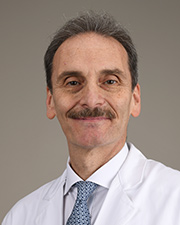
Jacques J. Morcos, MD, FRCS, FAANS
- Professor and Chair, John P. and Kathrine G. McGovern Distinguished Chair in Neuroscience
- Co-Director, UTHealth Houston Neurosciences
- Complex Brain Tumors
- Skull-Base Tumors
- Cerebrovascular Lesions
- Trigeminal Neuralgia
- Hemifacial Spasm
Contact
(713) 486-8000(713) 486-8088 fax
Biography
Dr. Jacques J. Morcos is a highly renowned, double fellowship-trained neurosurgeon whose areas of expertise span cerebrovascular lesions, including aneurysms, brain arteriovenous and cavernous malformations, dural arteriovenous fistulae, MoyaMoya disease, stroke and cerebral ischemia, carotid endarterectomy, bypass surgery (STA-MCA and high flow), microvascular decompression for trigeminal neuralgia and hemifacial spasm, as well as complex brain tumors including skull base tumors such as pituitary adenomas, meningiomas, acoustic neuromas, and head and neck cancers, and radiosurgery. He is highly experienced in multidisciplinary minimally invasive endonasal endoscopic approaches, as well as all open skull base approaches.
A native of Lebanon, Dr. Morcos earned his medical degree at the American University of Beirut. After initially starting his post-graduate training in England, he completed residency training
in neurological surgery at the University of Minnesota Hospital and Clinics, a fellowship in cerebrovascular surgery at the University of Florida College of Medicine, and a fellowship in cerebrovascular and skull base surgery at Barrow Neurological Institute in Phoenix.
He joins McGovern Medical School and UTHealth Houston Neurosciences from the Department of Neurosurgery at the University of Miami Health System, where he was co-chair as well as professor of clinical neurosurgery and otolaryngology, director of cerebrovascular surgery, director of skull base surgery, and division chief of cranial neurosurgery at Jackson Memorial Hospital in Miami. He served on the University of Miami Miller School of Medicine faculty for 28 years, joining in 1995 as assistant professor of clinical neurosurgery and otolaryngology.
Dr. Morcos’ research includes observational studies in aneurysm surveillance, an AVM registry, the impact of targeted therapies in NF2 acoustic neuromas, and laboratory dissections to optimize and innovate neurosurgical approaches. He is co-founder of the International Registry of MCA Bypass in Cerebral Ischemia. He has trained dozens of fellows in cerebrovascular and skull base surgery and is highly active in national and international neurosurgical societies. He is currently president-elect of the American Association of Neurological Surgeons and will assume the presidency in 2024. He also is president-elect of the World Federation of Skull Base Societies, assuming the presidency in 2025.
He is fluent in English, Arabic, Spanish and French.
Collaboration with Referring Physicians
Physicians at UTHealth Houston Neurosciences engage referring physicians in the care of their patients, keeping them informed about patient progress throughout the evaluation and treatment
process. After a patient’s treatment, referring physicians receive a summary and a plan for follow-up. Our physicians encourage continued communication about each patient.
In the News
After a Lubbock, TX mom’s 6-year-old lost the ability to move and breath on his own after developing bleeding near his brainstem, she found help from UTHealth Houston neurosurgeon Dr. Jacques Morcos, who helped transfer him to Houston for surgery to help regain his health.
For Patients
If you are interested in learning more about Dr. Morcos’ clinical practice, please click here.
Request Appointment »
Education
- Medical Degree
- American University of Beirut
- Residency
- University of Minnesota Hospital and Clinics
- Fellowship, cerebrovascular surgery
- University of Florida College of Medicine
- Fellowship in cerebrovascular and skull base surgery
- Barrow Neurological Institute
Areas of Interest
Clinical Interests
Dr. Morcos’ areas of expertise span cerebrovascular lesions, including aneurysms, brain arteriovenous and cavernous malformations, dural arteriovenous fistulae, MoyaMoya disease, stroke and cerebral ischemia, carotid endarterectomy, bypass surgery (STA-MCA and high flow), microvascular decompression for trigeminal neuralgia and hemifacial spasm, as well as complex brain tumors including skull base tumors such as pituitary adenomas, meningiomas, acoustic neuromas, and head and neck cancers, and radiosurgery. He is highly experienced in multidisciplinary minimally invasive endonasal endoscopic approaches, as well as all open skull base approaches.
Research Interests
Dr. Morcos’ research includes observational studies in aneurysm surveillance, an AVM registry, the impact of targeted therapies in NF2 acoustic neuromas, and laboratory dissections to optimize and innovate neurosurgical approaches.